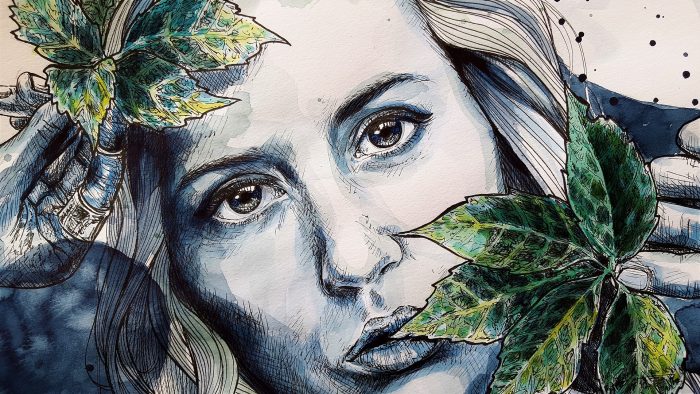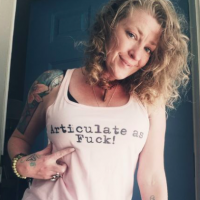I am transparent about my history with addiction.
I used meth from the time I was 16 to 23.
It cost me a marriage, several homes, and for a time, custody of my daughter.
Using dope was thrilling but, thankfully, it ran its course of destruction.
As the dope left my system, I made an agreement with myself: I wanted to be aware of this substance departing my body, my energy field, and to take note of how it had distorted my thought processes, priorities, and emotional capacity.
Nearly 17 years free from meth, I’m carefully examining another addiction. It is harder to track, and requires even more compassion than my extraction from methamphetamine. It has been with me far longer and caused as much, if not more, damage to my life. It is my addiction to drama.
I suffer from anxiety. It comes and goes and is getting consistently better, and less debilitating, the more of my own trauma I unpack. My episodes are usually triggered by feelings of rejection, abandonment (real or imagined), or extreme (if irrational) worry.
It can also get triggered by actual events, like when the engine of my car blew up on my way back from picking my mom up from Texas to return her to Montana (where I live) in the middle of a pandemic! That was insanely, and rightfully, anxiety-inducing. We were forced to stay in a hotel, and I didn’t sleep for two days. That made sense. It was crazy stressful.
Most recently, I had an episode triggered by being worried about a dear friend and his kids getting home safely after meeting them for lunch. This was not a normal sense of worry; this was extreme. And it wasn’t completely alleviated by finding out that everything was okay.
My brain fed me a narrative that my body then gripped—deep unrest seeped from me, this fear that things were not okay would not let go. The conversation that he and I had later left me feeling like I had missed something important. This is common for me when I have anxiety.
Then more information got added to the PTSD pot. A seriously traumatic event from my childhood—that I did not remember—was brought to my attention. That too, I latched onto and could not let go. As old hurts surfaced, I tried to sort through them in a way that did not reinjure me. Trauma happens too fast to process. We need to slow down, to feel to heal.
I let the freeze response run its course, moving slowly, and doing everything with care and caution. Ramping up my heart rate makes it worse. I held my feelings—my fear, anger, sadness, and confusion. How could someone who was supposed to love me treat me that way? And even scarier for me, how could I not remember?
I did my best to separate my past fears and pain from a current situation. Things are changing with my lover.
Our brain will create trance states to protect us when we cannot process a traumatic event. This means it will distort our memories of events, highlighting or disappearing details and feelings that we do not, at the time, have the capacity to process. We will replay these events, internally and externally, in an event to bring the loop to resolution.
This is where my anxiety and, what I am also now considering, my addiction to drama comes from. Emotions would best be described as volatile in my split-family household. My primary caregivers were not skillful at navigating those waters within themselves and this spilled out onto those around them. I can recall my mother losing it over burning pancakes.
As I grew, I can remember gritting my teeth when playing with my cat. I can remember losing my temper with my brothers. I can remember knowing, instinctively, how to provoke my ex-husband into an argument. I can also remember thinking that if anyone saw me crying, they would know they had hurt me and could use it against me.
My use of meth not only created drama in my world—how could life with a bunch of paranoid tweekers not?—it externalized the drama that was already there.
I wish to extend myself extreme compassion as I type this, but I think I am more addicted to that drama, than I ever was to meth. I can use it without doing a line, without breaking my sobriety. And, in the interest of transparency, I will say that I still imbibe alcohol. It was never a problem for me. I enjoy a glass of wine with dinner or a good, dark, locally-brewed beer. I think for me, depressants aren’t as appealing and have, therefore, never been a problem.
However, that biochemical flood of norepinephrine, adrenaline, and dopamine is deeply addictive, and I can manufacture it all on my own with just a little stimulus, some reason to perceive real or imagined rejection, or—and this is the kicker that breaks my heart—something that makes me happy, like spending time with granddaughter, or meeting my lover’s kids. He’s a great dad.
So what do I do about this?
I think treating drama like an addiction will be my new approach. This means: I recognize that I am using it to avoid feeling something that is even more uncomfortable. What is more uncomfortable than anxiety? Grief. It’s not really, but it can be a deep well that one can drown in just as easily as be renewed.
The codependent in me wants to pull others into this spin with me to validate the drama: look how sad, distressed, and important I am. I gotta be careful here because I also know under this neuroses is a valid, tender, holy human need.
So what do I need? Connection. It’s something that we all need, some of us more than others. For a connection to be sustainable, it needs to be mutual, respectful, honest, and, for me, playful! It also needs space, and I am cautious when I start to feel the need for someone to be in my life in a certain way because, inevitably, I will begin to compromise myself to make sure that they will maintain their position.
I will stifle my voice and second guess my feelings and my desire to communicate. Once I have worked myself up, I need to know if people will show up for me. Shame peeks. This feels manipulative and immature, but I never learned what it feels like for someone to show up for me, and those who were close to me were impossible to out-drama. And that hurt.
So I sit down, and tune in. I hold my hurt and fear and give myself permission to—even when it feels messy and imperfect—let people in.
~












Read 13 comments and reply